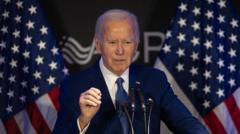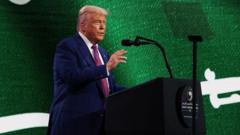In a surprising turn of events, President Trump met with Syrian interim leader Ahmed al-Sharaa, indicating a potential shift in US-Syria relations. Trump's remarks about easing sanctions have ignited hope among Syrians who face dire living conditions, though significant challenges remain.
Trump’s Meeting with Syrian Interim President Sparks Hope for Change

Trump’s Meeting with Syrian Interim President Sparks Hope for Change
President Trump explores normalizing relations with Syria after a historic meeting with Ahmed al-Sharaa, lifting sanctions amid rising optimism among Syrians.
In a pivotal moment for US-Syria relations, President Donald Trump met with Ahmed al-Sharaa, the interim president of Syria, during his visit to Riyadh. This meeting, which many considered unimaginable just months ago, took place as Trump hinted at the possibility of normalizing relations with Syria, following the end of Assad's longstanding regime.
Immediately after their brief yet consequential 37-minute conversation, which was held in a lavish Saudi palace and included Saudi Crown Prince Mohammad bin Salman and Turkish President Recep Tayyip Erdogan on the phone, Trump expressed optimism about al-Sharaa's leadership potential. The former fighter had witnessed a remarkable transformation, shedding his prior associations with Al-Qaeda, especially since the US bounty on his head was lifted just last December.
Acknowledging the influence of bin Salman and Erdogan, Trump’s sudden policy shift—which included the lifting of stringent US sanctions—received a warm reception at a major investment forum. This about-face marks a departure from previous statements asserting minimal US interest in Syria.
Looking ahead, the meeting could represent a significant change for Syria, where overwhelming poverty has gripped 90% of the population amid ongoing civil strife. Hind Kabawat, Syria's minister of social affairs, described this as a “new light at the end of this tunnel,” emphasizing the urgent need for sanctions relief. Easing restrictions could pave the way for increased international engagement and revitalization of Syria's battered economy.
Locals expressed profound frustration, likening their situation to being the "North Korea of the Middle East." With a potential lifting of sanctions, hope has emerged that displaced Syrians might return and that a new government could emerge capable of addressing widespread discontent.
However, experts warn that the path to dismantling the extensive web of sanctions will be complex, requiring a sustained commitment from the Trump administration. While some sanctions can be quickly rescinded, the overarching framework demands significant political maneuvering.
In an intricate geopolitical puzzle, Syria's fast-forming alliances with regional powers such as Turkey and Saudi Arabia are likely to influence the normalization process. For Trump, a primary condition for full reconciliation with Syria includes a commitment to the Abraham Accords—an agreement fostering normalization between Israel and several Arab nations.
Al-Sharaa has reportedly indicated a willingness to align Syria with Israel under favorable terms, even amid ongoing Israeli concerns regarding the presence of foreign fighters within the country. President Trump referred to this moment as “a chance at greatness,” while millions of Syrians hope it could signal a fresh beginning in their lives marred by years of hardship.






















